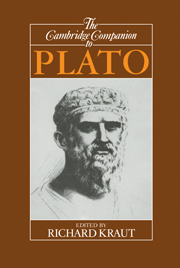Book contents
- Frontmatter
- 1 Introduction to the study of Plato
- 2 Plato
- 3 Stylometry and chronology
- 4 Socrates and the early dialogues
- 5 Mathematical method and philosophical truth
- 6 Inquiry in the Meno
- 7 Plato and Greek religion
- 8 Platonic love
- 9 Plato's metaphysical epistemology
- 10 The defense of justice in Plato's Republic
- 11 Plato on poetic creativity
- 12 Good-bye to the Third Man
- 13 Plato's Sophist on false statements
- 14 Disintegration and restoration
- 15 Plato's later political thought
- Bibliography
- Index
1 - Introduction to the study of Plato
Published online by Cambridge University Press: 28 May 2006
- Frontmatter
- 1 Introduction to the study of Plato
- 2 Plato
- 3 Stylometry and chronology
- 4 Socrates and the early dialogues
- 5 Mathematical method and philosophical truth
- 6 Inquiry in the Meno
- 7 Plato and Greek religion
- 8 Platonic love
- 9 Plato's metaphysical epistemology
- 10 The defense of justice in Plato's Republic
- 11 Plato on poetic creativity
- 12 Good-bye to the Third Man
- 13 Plato's Sophist on false statements
- 14 Disintegration and restoration
- 15 Plato's later political thought
- Bibliography
- Index
Summary
Plato (427-347 B.C.) stands at the head of our philosophical tradition, being the first Western thinker to produce a body of writing that touches upon the wide range of topics that are still discussed by philosophers today under such headings as metaphysics, epistemology, ethics, political theory, language, art, love, mathematics, science, and religion. He may in this sense be said to have invented philosophy as a distinct subject, for although all of these topics were, of course, discussed by his intellectual predecessors and contemporaries, he was the first to bring them together by giving them a unitary treatment. He conceives of philosophy as a discipline with a distinctive intellectual method, and he makes radical claims for its position in human life and the political community. Because philosophy scrutinizes assumptions that other studies merely take for granted, it alone can give us genuine understanding; since it discovers a realm of objects inaccessible to the senses and yields an organized system of truths that go far beyond and in some cases undermine common sense, it should lead to a transformation in the way we live our lives and arrange our political affairs. It is an autonomous subject and not the instrument of any other discipline, power, or creed; on the contrary, because it alone can grasp what is most important in human life, all other human endeavors should be subordinate to it.
- Type
- Chapter
- Information
- The Cambridge Companion to Plato , pp. 1 - 50Publisher: Cambridge University PressPrint publication year: 1992
- 10
- Cited by

